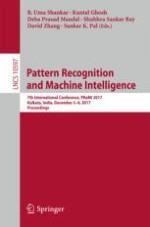2017 | OriginalPaper | Buchkapitel
Lexical TF-IDF: An n-gram Feature Space for Cross-Domain Classification of Sentiment Reviews
verfasst von : Atanu Dey, Mamata Jenamani, Jitesh J. Thakkar
Erschienen in: Pattern Recognition and Machine Intelligence
Aktivieren Sie unsere intelligente Suche, um passende Fachinhalte oder Patente zu finden.
Wählen Sie Textabschnitte aus um mit Künstlicher Intelligenz passenden Patente zu finden. powered by
Markieren Sie Textabschnitte, um KI-gestützt weitere passende Inhalte zu finden. powered by
